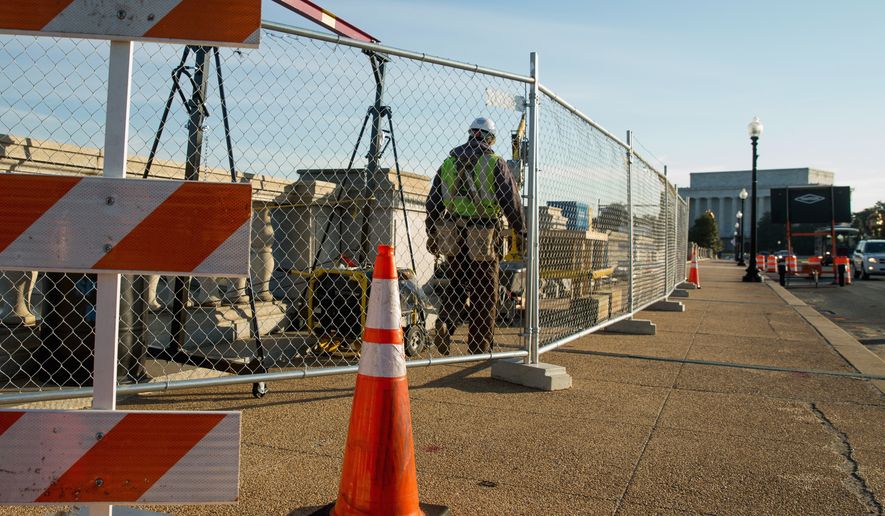The push to get local construction firms to hire city workers is falling badly short of its goals, with companies facing little risk of penalties for noncompliance and numerous ways to cheat the system.
Trade associations and construction company owners recently told a D.C. Council hearing that they face many challenges meeting city mandates to hire local workers, including a shortage of supply and onerous record-keeping standards.
But some council members expressed frustration that many employers are flouting the rules. A damning recent audit revealed that D.C. government officials rarely enforce regulations already on the books.
“The developers are very, very aware that the likelihood of receiving a fine is very low or a necessary cost of doing business in the city,” Council member Trayon White Sr., Ward 8 Democrat, said during the hearing.
The Department of Employment Services fined only one construction company from 2013 to 2016 for failing to follow the District’s First Source requirement that companies hire local workers if a project receives taxpayer dollars, according to a report from the D.C. auditor’s office.
The April audit revealed that the Department of Employment Services’ inconsistent enforcement and poor record-keeping rendered the First Source program, first implemented in 1984, “ineffective, and allows some beneficiaries to receive government assistance without having to comply with the law requirements.”
The review of First Source contracts with construction firms, retailers and other companies for the fiscal years 2014 to 2016 found that more than 80 percent of the law’s provisions either had not been implemented or implemented poorly, and that there was little documentation that companies were fulfilling pledges to give first preference to unemployed city residents to fill vacancies.
“As a government, we’ve got to stop making promises that we don’t keep,” D.C. Auditor Kathy Patterson said at the release of the April review.
Unique Morris-Hughes, interim director of the Department of Employment Services, testified last week that the department has since improved policies and trained more First Source compliance specialists, but that the agency still requires more information technology improvements to meet its goals.
“We cannot provide as robust data and analysis. But I do believe we are in compliance with the law,” said Ms. Morris-Hughes.
Analysts say the District’s construction labor shortage could worsen since President Trump rescinded temporary protected status for tens of thousands of legal Honduran and Salvadoran immigrants, who make up a large portion of skilled laborers in the city.
Data integrity
Several public witnesses at the oversight hearing, including Deputy Auditor Lawrence Perry, said data analysis was a weak spot.
“How do we know that data has integrity?” asked D.C. Council member Elissa Silverman, an at-large independent who chaired the hearing as head of the city’s Committee on Labor and Workforce Development.
“There’s actually no way to verify the figures,” said Mr. Perry. He explained that the Department of Employment Services relies on companies’ self-reporting to compile its data for hiring numbers. The city does not conduct its own payroll reviews.
Council members expressed concern about the quality of the data they were receiving. They had just earmarked $500,000 in next year’s budget for an independent data watchdog program after schools in the District were caught inflating graduation rates and failing to report residency fraud.
Employers told the hearing that compiling accurate, timely data is complicated by the District’s affordable housing shortage as the local economy booms. Many workers hired in D.C. have been moving willingly or unwillingly out of the city in search of lower living costs.
“We have great wages in this city that we are offering for people in this city, but the housing situation is now forcing them out of the city,” said Brian Mattingly, president of excavation and demolition company Goldin and Stafford LLC.
Mr. Mattingly testified that employers often invest in young D.C. workers fresh out of vocational schools but risk falling out of compliance with their local hiring quotas when those workers move out of the city in search of affordable housing.
Bryan Weaver, former Ward 1 advisory neighborhood commissioner, highlighted concerns about one project at the Line Hotel in Adams Morgan, which he contended is intentionally obscuring data reported to First Source in order to remain eligible for a 20-year, $46 million tax abatement plan. D.C. residents hired as guards, community coaches or historians were counted toward the First Source tally of local construction laborers to make the numbers work, he said.
“At least 177 of the hours come from obvious nonconstruction sources,” said Mr. Weaver. “At best, this is an attempt to muddy the waters of the agreement [with the city]. At worst, this is an overt attempt to commit fraud against the District of Columbia.”
Roderic Woodson, an attorney for Line Hotel project subcontractor Power Design, said First Source has a “punitive attack posture” and that companies struggle with hiring local laborers when the workforce suffers from “poor educational achievement and poor life skills.”
Some witnesses told the council that no amount of data analysis or good will fix the labor shortage in the industry when construction cranes are towering over the local landscape.
Some 2,072 licensed journey workers in the electrical industry are employed in the District, but only 146 are D.C. residents, Grant Schmelzer, executive director the local chapter of Independent Electrical Contractors, told the hearing.
“To me, that should speak volumes as to what the problems are,” he said.
• Julia Airey can be reached at jairey@washingtontimes.com.




Please read our comment policy before commenting.